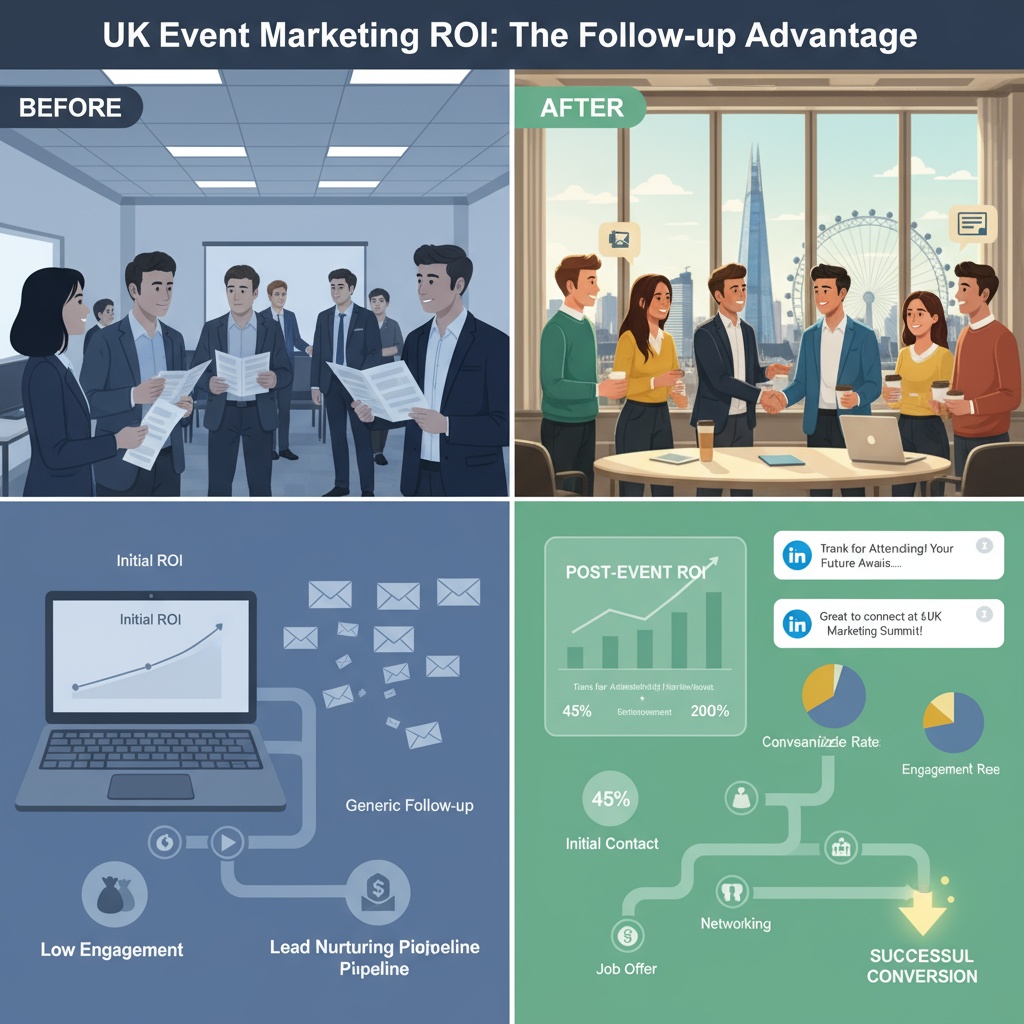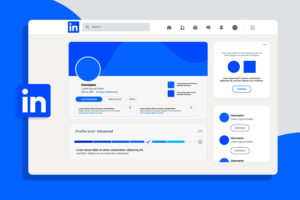Event marketing is no longer just about creating a memorable experience during the event — it’s equally about what happens after the event. The follow-up phase determines whether your investment of time, creativity, and money truly pays off. In the UK, where events form a huge part of business and community engagement, having a post-event strategy can significantly boost ROI (Return on Investment).
In this blog, we’ll explore practical strategies UK event marketers and fresh graduates can use to maximise results through post-event follow-ups, data-driven insights, and smart engagement.
Post-Event Engagement Trends in the UK:
The UK’s event marketing industry continues to evolve, with post-event engagement now becoming a priority. According to Eventbrite and B2B Marketing data, over 70% of event professionals believe that engagement doesn’t end when the event does — it’s a continuous relationship-building process.
Today, UK marketers use a mix of email campaigns, social media content, online surveys, and video recaps to keep audiences engaged. Sharing thank-you posts, event highlights, or behind-the-scenes footage keeps attendees connected to your brand.
For graduates stepping into event marketing, understanding this engagement cycle is key to ensuring repeat participation and sustained brand awareness.
ROI Tracking and Performance Analytics:
To boost Post-Event Marketing ROI, tracking performance metrics is essential. Gone are the days when attendance alone determined success. UK event professionals now rely on data analytics tools such as Google Analytics, HubSpot, and Eventbrite Insights to measure outcomes.
Some of the most useful post-event metrics include:
-
Attendee satisfaction scores (from feedback forms or surveys)
-
Social media engagement (likes, shares, mentions, and comments)
-
Leads generated and conversion rate
-
Cost per lead and overall ROI
For graduates learning to measure marketing outcomes, developing skills in data analysis, CRM platforms, and Excel reporting will make them highly employable in the UK’s growing events industry.
Lead Nurturing After Events:
A successful event often generates hundreds of leads — but what happens next determines long-term ROI. Post-event lead nurturing focuses on turning interest into action.
Here’s how UK marketers are doing it effectively:
-
Sending personalised follow-up emails within 24–48 hours.
-
Connecting with attendees on LinkedIn or Stunited for ongoing dialogue.
-
Sharing exclusive resources, such as presentation slides or discount codes.
-
Segmenting leads based on interests for targeted communication.
Fresh graduates should learn the art of maintaining professional relationships through polite, timely, and value-driven communication. This skill is invaluable in the UK’s competitive marketing and events job market.
Technology in Post-Event Strategies:
Technology has revolutionised how UK organisations manage their post-event follow-ups. Platforms like Salesforce, HubSpot, Zoho CRM, and Eventbrite automate repetitive tasks such as sending thank-you emails, tracking open rates, and segmenting audience data.
Using automation and AI-driven tools, marketers can identify their most engaged attendees, track conversions, and prioritise follow-up actions. For example, an attendee who downloaded your event brochure or rewatched your live session should be nurtured differently than one who simply registered.
Graduates interested in event marketing should familiarise themselves with these CRM and automation tools, as they are increasingly used across UK marketing agencies and event management firms.
Read more: The Psychology Behind Successful Event Marketing Campaigns
Using Social Media for Post-Event Buzz:
Social media plays a vital role in extending event visibility beyond the actual date. Platforms like TikTok, Instagram, LinkedIn, and X (Twitter) allow brands to keep conversations alive for weeks after the event.
Some creative ideas to maintain buzz include:
-
Sharing event recap videos or “best moments” compilations.
-
Posting thank-you messages to attendees, speakers, and sponsors.
-
Hosting a post-event Q&A or feedback session on Instagram Live or LinkedIn.
-
Encouraging participants to share their experiences using a branded hashtag.
This not only boosts engagement but also builds community trust — something highly valued in UK event marketing.
Content Repurposing for Brand Longevity:
Every event generates a wealth of valuable content — from speaker sessions to attendee testimonials. Smart UK marketers don’t let that go to waste.
Repurposing content keeps your brand visible long after the event has ended. You can:
-
Turn recorded sessions into short-form videos or podcasts.
-
Convert panel discussions into blog articles or whitepapers.
-
Create an infographic summarising event insights and statistics.
-
Use quotes from speakers or attendees as social media snippets.
This approach strengthens your long-term content marketing strategy while improving SEO, visibility, and authority in your niche.
Case Studies: UK Events with Strong Follow-Ups:
A few UK-based organisations are setting examples in effective post-event marketing.
-
The Event Marketing Association (EMA) sends personalised follow-up surveys and compiles key takeaways into downloadable reports for attendees.
-
Tech UK Conferences release post-event highlight reels, tagging sponsors and speakers to maximise digital reach.
-
London Business Forum follows up with exclusive webinar invites for attendees who showed high engagement during the event.
These examples demonstrate how consistent post-event communication builds loyalty and enhances ROI — a valuable lesson for new professionals entering this sector.
Metrics to Evaluate Success:
Measuring success goes beyond counting likes or attendees. UK event marketers track multiple Key Performance Indicators (KPIs) such as:
-
Engagement Rate: How actively attendees interacted post-event.
-
Lead Conversion Rate: Percentage of leads that converted to customers.
-
Customer Retention: How many attendees register for future events.
-
Social Media Growth: New followers and mentions after event week.
-
Revenue Attribution: Sales or sign-ups directly linked to the event.
Tracking these KPIs provides data to refine strategies and improve future event ROI.
Best Practices for Communication Tone:
The tone of post-event communication can make or break brand relationships. In the UK, where professionalism and courtesy are highly valued, maintaining a tone that is personal, respectful, and appreciative is key.
Best practices include:
-
Always include a thank-you note in your first follow-up message.
-
Personalise communication with the attendee’s name or event role.
-
Avoid overly promotional messages — focus on value and relationship.
-
Keep follow-ups consistent but not excessive (2–3 emails over two weeks is ideal).
This approach strengthens trust and fosters long-term engagement — essential qualities for both event brands and aspiring marketers.
Career Tips for UK Graduates Entering Event Marketing:
Event marketing offers exciting opportunities for fresh UK graduates with skills in creativity, digital marketing, and analytics. Here’s how they can prepare:
-
Learn CRM and analytics tools like HubSpot, Salesforce, and Google Analytics.
-
Gain hands-on experience through internships or volunteering at events.
-
Build a LinkedIn or Stunited profile showcasing your marketing projects.
-
Stay updated on event marketing trends, including post-event ROI tactics.
-
Develop strong communication and relationship management skills.
With the rise of hybrid and digital events, skilled marketers who understand both event planning and digital engagement will be in high demand across the UK.
Conclusion:
Post-event follow-up is no longer an afterthought — it’s a vital stage of the event marketing lifecycle. For UK organisations, it’s the key to sustaining engagement, nurturing leads, and maximising ROI.
By leveraging technology, social media, and data analytics, event marketers can turn one-time attendees into loyal brand advocates. And for graduates, mastering post-event strategies can open the door to a rewarding career in the UK’s thriving marketing and events industry.
The true success of an event is not measured by applause during the session, but by the relationships, conversions, and opportunities that continue to grow afterwards.
Get Personal Branding with complete interview assistance for UK jobs: www.brandme4job.com
Get your CV checked and improve it with section based detailed recommendation, for free: Brand Me 4 Job Free CV Check!
Joinwww.stunited.org to build a wide network in the United Kingdom.
Contact us to get Career Assistance in the UK: Call Us Now!
To get regular job, career, and industry updates along with important UK jobs-related information, follow us on: Instagram, LinkedIn & Facebook
#EventMarketingUK #PostEventStrategy #EventROI #MarketingAnalytics #EventFollowUp #UKEventsIndustry #EventEngagement #DigitalMarketingUK #LeadNurturing #MarketingStrategy
#EventProfessionalsUK #EventSuccess #ROITracking #PostEventMarketing #EventManagementUK #ContentMarketingUK #EventAutomation #SocialMediaMarketing #EventPerformance
#UKMarketingCareers #EventBuzz #EventPromotionUK #MarketingForEvents #EventTrends2025 #EventInsights #BrandEngagementUK #HybridEventsUK #DataDrivenMarketing
#PostEventEngagement #EventGrowthUK





